 “The amount we know about our African heritage varies from individual to individual,” says Johnson Artur. What they do have in common however, is a history of struggle against a commonly encountered resistance to the presence of black people in Russia. “Those who grew up and live in Russia still have to justify on a daily basis the fact that they are Russians too.” Johnson Artur hopes her project will go some to connecting and making visible the generation of black Russians that have grown up calling the country home.
“The amount we know about our African heritage varies from individual to individual,” says Johnson Artur. What they do have in common however, is a history of struggle against a commonly encountered resistance to the presence of black people in Russia. “Those who grew up and live in Russia still have to justify on a daily basis the fact that they are Russians too.” Johnson Artur hopes her project will go some to connecting and making visible the generation of black Russians that have grown up calling the country home.
17.02.2021 | by Red Africa
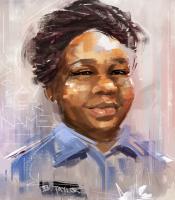 A lot of my pieces are social experiments to say, “What do you feel when you see this human life?” If your first reaction is to say, “They deserved to die because …,” that says a lot about who you are. I hope my art will speak to those people who are so quick to justify the taking of a human life, so that they think: “Wait. This person should still be on this earth. They deserved better.” Up until now, I’ve been creating art and advocating for Black lives from my perspective, of not wanting me to be pulled over and killed by the police.
A lot of my pieces are social experiments to say, “What do you feel when you see this human life?” If your first reaction is to say, “They deserved to die because …,” that says a lot about who you are. I hope my art will speak to those people who are so quick to justify the taking of a human life, so that they think: “Wait. This person should still be on this earth. They deserved better.” Up until now, I’ve been creating art and advocating for Black lives from my perspective, of not wanting me to be pulled over and killed by the police.
14.12.2020 | by Nikkolas Smith
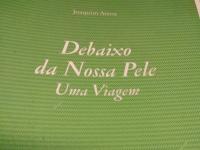 So what does being tropical mean? Being less concrete and assertive in our ideas and convictions? There’s certainly an art to filling the arid hours and empty nights here.
The bad news comes, here as everywhere, first thing in the morning. I retreat to the intimacy of my bookshelves and flick through a few tomes, while outside, the day quickly passes from fresh to mild to heat wave. It’s absurd to try and fit the news of someone’s death into the context of whatever story you have at hand, some false, pseudo-writerly notion of anguish. It’s as if a ghost has settled in between the lines and started hopping from noun to pronoun, though verbs would doubtless take it further.
So what does being tropical mean? Being less concrete and assertive in our ideas and convictions? There’s certainly an art to filling the arid hours and empty nights here.
The bad news comes, here as everywhere, first thing in the morning. I retreat to the intimacy of my bookshelves and flick through a few tomes, while outside, the day quickly passes from fresh to mild to heat wave. It’s absurd to try and fit the news of someone’s death into the context of whatever story you have at hand, some false, pseudo-writerly notion of anguish. It’s as if a ghost has settled in between the lines and started hopping from noun to pronoun, though verbs would doubtless take it further.
29.10.2020 | by Joaquim Arena
 The ASAA condemns the use of the police and military by African states to mete out violence against its citizens. We especially condemn the ongoing brutalities in Nigeria, spurred by the violation of human rights and abuses by the erstwhile Anti-Robbery Squad (SARS). The Anti- Robbery Squad (SARS) was a Nigerian police force unit that was created in late 1992 to deal with crimes associated with robbery, motor vehicle theft, kidnapping, cattle rustling and crimes involving firearms. However, over the years, SARS has been linked to extrajudicial killings, extortion, torture, framing citizens for crimes they didn’t commit, and blackmail.
The ASAA condemns the use of the police and military by African states to mete out violence against its citizens. We especially condemn the ongoing brutalities in Nigeria, spurred by the violation of human rights and abuses by the erstwhile Anti-Robbery Squad (SARS). The Anti- Robbery Squad (SARS) was a Nigerian police force unit that was created in late 1992 to deal with crimes associated with robbery, motor vehicle theft, kidnapping, cattle rustling and crimes involving firearms. However, over the years, SARS has been linked to extrajudicial killings, extortion, torture, framing citizens for crimes they didn’t commit, and blackmail.
22.10.2020 | by ASAA
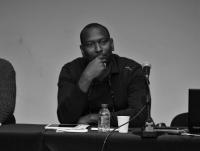 In the last weeks, political tensions in Portugal have arisen following public demonstrations of extreme right organizations that have also threatened anti-racist activists. On August 11, black antiracist activist Mamadou Ba and other nine persons (antiracist, antifascist and LGBT rights activists, MPs and trade union leaders) received an e-mail sent by a neo-Nazi movement that threatened them and their families if they did not leave the country in the next 48 hours.
In the last weeks, political tensions in Portugal have arisen following public demonstrations of extreme right organizations that have also threatened anti-racist activists. On August 11, black antiracist activist Mamadou Ba and other nine persons (antiracist, antifascist and LGBT rights activists, MPs and trade union leaders) received an e-mail sent by a neo-Nazi movement that threatened them and their families if they did not leave the country in the next 48 hours.
02.09.2020 | by vários
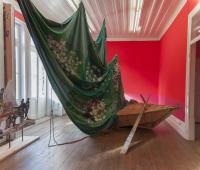 There is something poetic in a city cut through by a river, like the imperturbable flow of the Mondego between the banks from which Coimbra sprawls. The river is the image of continuity and impermanence, its time a tangent to infinity. Our existences, as fleeting as the people who cross it, the bridges that cut across it and the waters that pass through it, are the height of discontinuity; our time is minuscule compared to the river.
There is something poetic in a city cut through by a river, like the imperturbable flow of the Mondego between the banks from which Coimbra sprawls. The river is the image of continuity and impermanence, its time a tangent to infinity. Our existences, as fleeting as the people who cross it, the bridges that cut across it and the waters that pass through it, are the height of discontinuity; our time is minuscule compared to the river.
19.12.2019 | by Lígia Afonso, Agnaldo Farias and Nuno de Brito Rocha
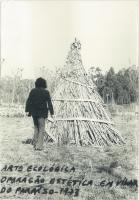 They create a network of different approaches to the rural and simultaneously call attention to ecological concerns. The works constitute potent signifiers within a global discourse of regionalism as well as representing a call to (poetic) action within our natural environment.
They create a network of different approaches to the rural and simultaneously call attention to ecological concerns. The works constitute potent signifiers within a global discourse of regionalism as well as representing a call to (poetic) action within our natural environment.
04.12.2019 | by vários
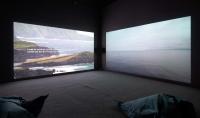 Keating accumulates the disregarded and overlooked traces of the Irish presence in Jamaica, inserting previously muted voices into the archive. In doing so, she critiques the dominant Western constructions of nationhood and identity, producing an alternative to the master narratives that shape one’ worldviews in the West.
Keating accumulates the disregarded and overlooked traces of the Irish presence in Jamaica, inserting previously muted voices into the archive. In doing so, she critiques the dominant Western constructions of nationhood and identity, producing an alternative to the master narratives that shape one’ worldviews in the West.
19.11.2019 | by Miguel Amado
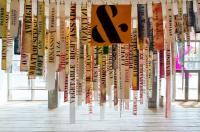 Reflecting on the relationship between humans and plants, this exhibition explores different narratives of technological mediation of the plant kingdom. The study of plants as infrastructure has raised interest among the scientific community over the last centuries, inspiring generations of researchers, as well as the development of technocosmologies and cybernetic systems.
Reflecting on the relationship between humans and plants, this exhibition explores different narratives of technological mediation of the plant kingdom. The study of plants as infrastructure has raised interest among the scientific community over the last centuries, inspiring generations of researchers, as well as the development of technocosmologies and cybernetic systems.
15.10.2019 | by Margarida Mendes
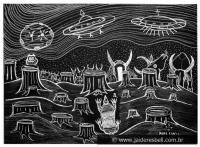 Although depleted of the colossal perspective lent to it by space navigation in the 1970s, the idea of humanity as a species was progressively turned into an immanent geological colossus capable of influencing the world’s cardinal rhythms – or at least such has been the description of its reach. Anthropocene is the geological epoch of the human species, it is said, and the proof lies in the sedimentary deposits that originated in the first nuclear experiments held in the 1950s. What is of course ignored is that this idea of “species” was artificially inseminated by the normative and cisgender marriage between modernity and colonialism, and that the colossal perspective is still believed to stop and stand outside motionless in front of the globe...
Although depleted of the colossal perspective lent to it by space navigation in the 1970s, the idea of humanity as a species was progressively turned into an immanent geological colossus capable of influencing the world’s cardinal rhythms – or at least such has been the description of its reach. Anthropocene is the geological epoch of the human species, it is said, and the proof lies in the sedimentary deposits that originated in the first nuclear experiments held in the 1950s. What is of course ignored is that this idea of “species” was artificially inseminated by the normative and cisgender marriage between modernity and colonialism, and that the colossal perspective is still believed to stop and stand outside motionless in front of the globe...
08.10.2019 | by
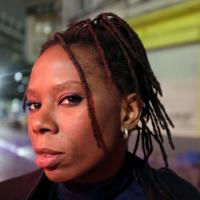 Or about this faraway socialist family whose stench of betrayal sullies our ideals. Make yourself, with all the others, into a mass of militant workers. Neurotics. Gentrified. You’ve got to walk down the white stripes that cross the Open Space of shuttered hives glistening in the sun: elbowing to keep your place, emphasizing your success to excess. The law of the jungle is the strongest survive.
Or about this faraway socialist family whose stench of betrayal sullies our ideals. Make yourself, with all the others, into a mass of militant workers. Neurotics. Gentrified. You’ve got to walk down the white stripes that cross the Open Space of shuttered hives glistening in the sun: elbowing to keep your place, emphasizing your success to excess. The law of the jungle is the strongest survive.
27.04.2019 | by Joëlle Sambi
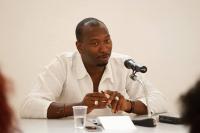 These latest events strip bare the racist system in which we live, enforced by the police and through normalised acts of violence against black people of all ages and sexes, and with the continued impunity of those responsible, reaching a level that can no longer be tolerated.
These latest events strip bare the racist system in which we live, enforced by the police and through normalised acts of violence against black people of all ages and sexes, and with the continued impunity of those responsible, reaching a level that can no longer be tolerated.
25.01.2019 | by vários
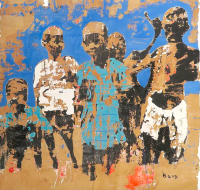 In his view, “either a society is racist or it is not” and “colonial racism is no different from other racisms.” It is when he tries to explain a key idea and expose a scandal that his poetic and rhetorical prose unfolds. Besides, for him, the liberation of the native means rejecting this interdicted world and embracing the “self” denied by the colonizer, who sees him as disorganised and docile: “The native is a being hemmed in; apartheid is simply one form of the division into compartments of the colonial world.
In his view, “either a society is racist or it is not” and “colonial racism is no different from other racisms.” It is when he tries to explain a key idea and expose a scandal that his poetic and rhetorical prose unfolds. Besides, for him, the liberation of the native means rejecting this interdicted world and embracing the “self” denied by the colonizer, who sees him as disorganised and docile: “The native is a being hemmed in; apartheid is simply one form of the division into compartments of the colonial world.
01.01.2019 | by Anne Mathieu
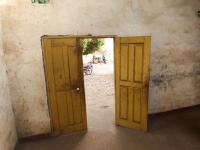 Streams of water trickle from the cotton sacks packed onto the truck, on a high wall. The load no longer weighs only eight tons, it weighs much more, but the accounts are settled, so it doesn’t matter. In my sweater, in my socks, the cotton fibres intertwine with threads of oil. If the truth is light and lies are as heavy as lead, the truck, wobbling at five miles an hour down the steep road, is carrying a great load of lies. But perhaps it is the opposite, that lies are light and the truth is heavy. In the eight hours I spent in the village, the price of a barrel of oil fell by a dollar.
Streams of water trickle from the cotton sacks packed onto the truck, on a high wall. The load no longer weighs only eight tons, it weighs much more, but the accounts are settled, so it doesn’t matter. In my sweater, in my socks, the cotton fibres intertwine with threads of oil. If the truth is light and lies are as heavy as lead, the truck, wobbling at five miles an hour down the steep road, is carrying a great load of lies. But perhaps it is the opposite, that lies are light and the truth is heavy. In the eight hours I spent in the village, the price of a barrel of oil fell by a dollar.
24.11.2018 | by Paulo Faria
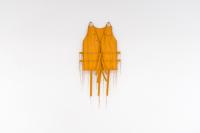 I said to one of them, who was very injured, “The troops can’t do anything for you, what do you want before you die?” He asked for water, I told the soldier to fetch water but gave him a signal not to go, that it wouldn’t be necessary. I picked up an FBP submachine gun, which wasn’t reliable, and fired a shot to kill him, but he stepped to the side.
I said to one of them, who was very injured, “The troops can’t do anything for you, what do you want before you die?” He asked for water, I told the soldier to fetch water but gave him a signal not to go, that it wouldn’t be necessary. I picked up an FBP submachine gun, which wasn’t reliable, and fired a shot to kill him, but he stepped to the side.
25.06.2018 | by Vasco Luís Curado
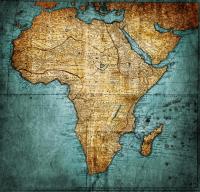 Part of our task is to build a canon, knowledge, and a way of knowing. This is happening against the backdrop of a movement by South African students to decolonise their universities; Black Lives Matter protests in the United States; and in the context of a much deeper history of national reimagination across Africa and the world.With this history in mind our faculty is working towards what we consider a decolonial social science curriculum. We’ve adopted seven commitments to help us meet this goal, and which we hope will shift educational discourse in a more equitable and representative direction.
Part of our task is to build a canon, knowledge, and a way of knowing. This is happening against the backdrop of a movement by South African students to decolonise their universities; Black Lives Matter protests in the United States; and in the context of a much deeper history of national reimagination across Africa and the world.With this history in mind our faculty is working towards what we consider a decolonial social science curriculum. We’ve adopted seven commitments to help us meet this goal, and which we hope will shift educational discourse in a more equitable and representative direction.
15.06.2017 | by Jess Auerbach
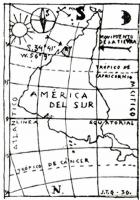 Philosophy students should be encouraged to engage with the challenging work of thinkers like Kwami Anthony Appiah, Franz Fanon, Achille Mbembe, Valentin-Yves Mudimbe, Enrique Dussell and Walter Mignolo just as they do with Parfit and Strawson. Should we not all be in the business of engaging, to quote Nietzsche, with 'what may be thought against our thought'?
Philosophy students should be encouraged to engage with the challenging work of thinkers like Kwami Anthony Appiah, Franz Fanon, Achille Mbembe, Valentin-Yves Mudimbe, Enrique Dussell and Walter Mignolo just as they do with Parfit and Strawson. Should we not all be in the business of engaging, to quote Nietzsche, with 'what may be thought against our thought'?
04.04.2017 | by World Philosophies
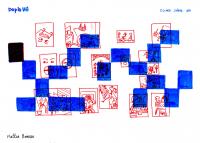 Duplo vê*, is at once, the name for the letter W in Portuguese (inspired by the title W ou les souvenirs d’enfance by George Perec) and also the “double sight” of a cross-eyed God. Duplo vê could have a subtitle: essay on the strabismus of God.
Duplo vê*, is at once, the name for the letter W in Portuguese (inspired by the title W ou les souvenirs d’enfance by George Perec) and also the “double sight” of a cross-eyed God. Duplo vê could have a subtitle: essay on the strabismus of God.
17.02.2017 | by Mattia Denisse
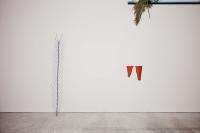 The current situation tells us in what way we should create empathy with the images of the world. Or how the images of the world are themselves empathy, understanding. An abstract economical system that obsessively copies the natural chaos.
Distribution, or relationship. The act of transaction and of eternal and permanent conflict.
The current situation tells us in what way we should create empathy with the images of the world. Or how the images of the world are themselves empathy, understanding. An abstract economical system that obsessively copies the natural chaos.
Distribution, or relationship. The act of transaction and of eternal and permanent conflict.
27.04.2015 | by Pedro Barateiro
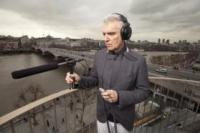 I hate world music. That's probably one of the perverse reasons I have been asked to write about it. The term is a catchall that commonly refers to non-Western music of any and all sorts, popular music, traditional music and even classical music. It's a marketing as well as a pseudomusical term — and a name for a bin in the record store signifying stuff that doesn't belong anywhere else in the store.
I hate world music. That's probably one of the perverse reasons I have been asked to write about it. The term is a catchall that commonly refers to non-Western music of any and all sorts, popular music, traditional music and even classical music. It's a marketing as well as a pseudomusical term — and a name for a bin in the record store signifying stuff that doesn't belong anywhere else in the store.
20.07.2012 | by David Byrne
 “The amount we know about our African heritage varies from individual to individual,” says Johnson Artur. What they do have in common however, is a history of struggle against a commonly encountered resistance to the presence of black people in Russia. “Those who grew up and live in Russia still have to justify on a daily basis the fact that they are Russians too.” Johnson Artur hopes her project will go some to connecting and making visible the generation of black Russians that have grown up calling the country home.
“The amount we know about our African heritage varies from individual to individual,” says Johnson Artur. What they do have in common however, is a history of struggle against a commonly encountered resistance to the presence of black people in Russia. “Those who grew up and live in Russia still have to justify on a daily basis the fact that they are Russians too.” Johnson Artur hopes her project will go some to connecting and making visible the generation of black Russians that have grown up calling the country home.  A lot of my pieces are social experiments to say, “What do you feel when you see this human life?” If your first reaction is to say, “They deserved to die because …,” that says a lot about who you are. I hope my art will speak to those people who are so quick to justify the taking of a human life, so that they think: “Wait. This person should still be on this earth. They deserved better.” Up until now, I’ve been creating art and advocating for Black lives from my perspective, of not wanting me to be pulled over and killed by the police.
A lot of my pieces are social experiments to say, “What do you feel when you see this human life?” If your first reaction is to say, “They deserved to die because …,” that says a lot about who you are. I hope my art will speak to those people who are so quick to justify the taking of a human life, so that they think: “Wait. This person should still be on this earth. They deserved better.” Up until now, I’ve been creating art and advocating for Black lives from my perspective, of not wanting me to be pulled over and killed by the police.  So what does being tropical mean? Being less concrete and assertive in our ideas and convictions? There’s certainly an art to filling the arid hours and empty nights here.
The bad news comes, here as everywhere, first thing in the morning. I retreat to the intimacy of my bookshelves and flick through a few tomes, while outside, the day quickly passes from fresh to mild to heat wave. It’s absurd to try and fit the news of someone’s death into the context of whatever story you have at hand, some false, pseudo-writerly notion of anguish. It’s as if a ghost has settled in between the lines and started hopping from noun to pronoun, though verbs would doubtless take it further.
So what does being tropical mean? Being less concrete and assertive in our ideas and convictions? There’s certainly an art to filling the arid hours and empty nights here.
The bad news comes, here as everywhere, first thing in the morning. I retreat to the intimacy of my bookshelves and flick through a few tomes, while outside, the day quickly passes from fresh to mild to heat wave. It’s absurd to try and fit the news of someone’s death into the context of whatever story you have at hand, some false, pseudo-writerly notion of anguish. It’s as if a ghost has settled in between the lines and started hopping from noun to pronoun, though verbs would doubtless take it further.  The ASAA condemns the use of the police and military by African states to mete out violence against its citizens. We especially condemn the ongoing brutalities in Nigeria, spurred by the violation of human rights and abuses by the erstwhile Anti-Robbery Squad (SARS). The Anti- Robbery Squad (SARS) was a Nigerian police force unit that was created in late 1992 to deal with crimes associated with robbery, motor vehicle theft, kidnapping, cattle rustling and crimes involving firearms. However, over the years, SARS has been linked to extrajudicial killings, extortion, torture, framing citizens for crimes they didn’t commit, and blackmail.
The ASAA condemns the use of the police and military by African states to mete out violence against its citizens. We especially condemn the ongoing brutalities in Nigeria, spurred by the violation of human rights and abuses by the erstwhile Anti-Robbery Squad (SARS). The Anti- Robbery Squad (SARS) was a Nigerian police force unit that was created in late 1992 to deal with crimes associated with robbery, motor vehicle theft, kidnapping, cattle rustling and crimes involving firearms. However, over the years, SARS has been linked to extrajudicial killings, extortion, torture, framing citizens for crimes they didn’t commit, and blackmail.  In the last weeks, political tensions in Portugal have arisen following public demonstrations of extreme right organizations that have also threatened anti-racist activists. On August 11, black antiracist activist Mamadou Ba and other nine persons (antiracist, antifascist and LGBT rights activists, MPs and trade union leaders) received an e-mail sent by a neo-Nazi movement that threatened them and their families if they did not leave the country in the next 48 hours.
In the last weeks, political tensions in Portugal have arisen following public demonstrations of extreme right organizations that have also threatened anti-racist activists. On August 11, black antiracist activist Mamadou Ba and other nine persons (antiracist, antifascist and LGBT rights activists, MPs and trade union leaders) received an e-mail sent by a neo-Nazi movement that threatened them and their families if they did not leave the country in the next 48 hours.  There is something poetic in a city cut through by a river, like the imperturbable flow of the Mondego between the banks from which Coimbra sprawls. The river is the image of continuity and impermanence, its time a tangent to infinity. Our existences, as fleeting as the people who cross it, the bridges that cut across it and the waters that pass through it, are the height of discontinuity; our time is minuscule compared to the river.
There is something poetic in a city cut through by a river, like the imperturbable flow of the Mondego between the banks from which Coimbra sprawls. The river is the image of continuity and impermanence, its time a tangent to infinity. Our existences, as fleeting as the people who cross it, the bridges that cut across it and the waters that pass through it, are the height of discontinuity; our time is minuscule compared to the river.  They create a network of different approaches to the rural and simultaneously call attention to ecological concerns. The works constitute potent signifiers within a global discourse of regionalism as well as representing a call to (poetic) action within our natural environment.
They create a network of different approaches to the rural and simultaneously call attention to ecological concerns. The works constitute potent signifiers within a global discourse of regionalism as well as representing a call to (poetic) action within our natural environment.  Keating accumulates the disregarded and overlooked traces of the Irish presence in Jamaica, inserting previously muted voices into the archive. In doing so, she critiques the dominant Western constructions of nationhood and identity, producing an alternative to the master narratives that shape one’ worldviews in the West.
Keating accumulates the disregarded and overlooked traces of the Irish presence in Jamaica, inserting previously muted voices into the archive. In doing so, she critiques the dominant Western constructions of nationhood and identity, producing an alternative to the master narratives that shape one’ worldviews in the West.  Reflecting on the relationship between humans and plants, this exhibition explores different narratives of technological mediation of the plant kingdom. The study of plants as infrastructure has raised interest among the scientific community over the last centuries, inspiring generations of researchers, as well as the development of technocosmologies and cybernetic systems.
Reflecting on the relationship between humans and plants, this exhibition explores different narratives of technological mediation of the plant kingdom. The study of plants as infrastructure has raised interest among the scientific community over the last centuries, inspiring generations of researchers, as well as the development of technocosmologies and cybernetic systems.  Although depleted of the colossal perspective lent to it by space navigation in the 1970s, the idea of humanity as a species was progressively turned into an immanent geological colossus capable of influencing the world’s cardinal rhythms – or at least such has been the description of its reach. Anthropocene is the geological epoch of the human species, it is said, and the proof lies in the sedimentary deposits that originated in the first nuclear experiments held in the 1950s. What is of course ignored is that this idea of “species” was artificially inseminated by the normative and cisgender marriage between modernity and colonialism, and that the colossal perspective is still believed to stop and stand outside motionless in front of the globe...
Although depleted of the colossal perspective lent to it by space navigation in the 1970s, the idea of humanity as a species was progressively turned into an immanent geological colossus capable of influencing the world’s cardinal rhythms – or at least such has been the description of its reach. Anthropocene is the geological epoch of the human species, it is said, and the proof lies in the sedimentary deposits that originated in the first nuclear experiments held in the 1950s. What is of course ignored is that this idea of “species” was artificially inseminated by the normative and cisgender marriage between modernity and colonialism, and that the colossal perspective is still believed to stop and stand outside motionless in front of the globe...  Or about this faraway socialist family whose stench of betrayal sullies our ideals. Make yourself, with all the others, into a mass of militant workers. Neurotics. Gentrified. You’ve got to walk down the white stripes that cross the Open Space of shuttered hives glistening in the sun: elbowing to keep your place, emphasizing your success to excess. The law of the jungle is the strongest survive.
Or about this faraway socialist family whose stench of betrayal sullies our ideals. Make yourself, with all the others, into a mass of militant workers. Neurotics. Gentrified. You’ve got to walk down the white stripes that cross the Open Space of shuttered hives glistening in the sun: elbowing to keep your place, emphasizing your success to excess. The law of the jungle is the strongest survive.  These latest events strip bare the racist system in which we live, enforced by the police and through normalised acts of violence against black people of all ages and sexes, and with the continued impunity of those responsible, reaching a level that can no longer be tolerated.
These latest events strip bare the racist system in which we live, enforced by the police and through normalised acts of violence against black people of all ages and sexes, and with the continued impunity of those responsible, reaching a level that can no longer be tolerated.  In his view, “either a society is racist or it is not” and “colonial racism is no different from other racisms.” It is when he tries to explain a key idea and expose a scandal that his poetic and rhetorical prose unfolds. Besides, for him, the liberation of the native means rejecting this interdicted world and embracing the “self” denied by the colonizer, who sees him as disorganised and docile: “The native is a being hemmed in; apartheid is simply one form of the division into compartments of the colonial world.
In his view, “either a society is racist or it is not” and “colonial racism is no different from other racisms.” It is when he tries to explain a key idea and expose a scandal that his poetic and rhetorical prose unfolds. Besides, for him, the liberation of the native means rejecting this interdicted world and embracing the “self” denied by the colonizer, who sees him as disorganised and docile: “The native is a being hemmed in; apartheid is simply one form of the division into compartments of the colonial world.  Streams of water trickle from the cotton sacks packed onto the truck, on a high wall. The load no longer weighs only eight tons, it weighs much more, but the accounts are settled, so it doesn’t matter. In my sweater, in my socks, the cotton fibres intertwine with threads of oil. If the truth is light and lies are as heavy as lead, the truck, wobbling at five miles an hour down the steep road, is carrying a great load of lies. But perhaps it is the opposite, that lies are light and the truth is heavy. In the eight hours I spent in the village, the price of a barrel of oil fell by a dollar.
Streams of water trickle from the cotton sacks packed onto the truck, on a high wall. The load no longer weighs only eight tons, it weighs much more, but the accounts are settled, so it doesn’t matter. In my sweater, in my socks, the cotton fibres intertwine with threads of oil. If the truth is light and lies are as heavy as lead, the truck, wobbling at five miles an hour down the steep road, is carrying a great load of lies. But perhaps it is the opposite, that lies are light and the truth is heavy. In the eight hours I spent in the village, the price of a barrel of oil fell by a dollar.
 I said to one of them, who was very injured, “The troops can’t do anything for you, what do you want before you die?” He asked for water, I told the soldier to fetch water but gave him a signal not to go, that it wouldn’t be necessary. I picked up an FBP submachine gun, which wasn’t reliable, and fired a shot to kill him, but he stepped to the side.
I said to one of them, who was very injured, “The troops can’t do anything for you, what do you want before you die?” He asked for water, I told the soldier to fetch water but gave him a signal not to go, that it wouldn’t be necessary. I picked up an FBP submachine gun, which wasn’t reliable, and fired a shot to kill him, but he stepped to the side.  Part of our task is to build a canon, knowledge, and a way of knowing. This is happening against the backdrop of a movement by South African students to decolonise their universities; Black Lives Matter protests in the United States; and in the context of a much deeper history of national reimagination across Africa and the world.With this history in mind our faculty is working towards what we consider a decolonial social science curriculum. We’ve adopted seven commitments to help us meet this goal, and which we hope will shift educational discourse in a more equitable and representative direction.
Part of our task is to build a canon, knowledge, and a way of knowing. This is happening against the backdrop of a movement by South African students to decolonise their universities; Black Lives Matter protests in the United States; and in the context of a much deeper history of national reimagination across Africa and the world.With this history in mind our faculty is working towards what we consider a decolonial social science curriculum. We’ve adopted seven commitments to help us meet this goal, and which we hope will shift educational discourse in a more equitable and representative direction.  Philosophy students should be encouraged to engage with the challenging work of thinkers like Kwami Anthony Appiah, Franz Fanon, Achille Mbembe, Valentin-Yves Mudimbe, Enrique Dussell and Walter Mignolo just as they do with Parfit and Strawson. Should we not all be in the business of engaging, to quote Nietzsche, with 'what may be thought against our thought'?
Philosophy students should be encouraged to engage with the challenging work of thinkers like Kwami Anthony Appiah, Franz Fanon, Achille Mbembe, Valentin-Yves Mudimbe, Enrique Dussell and Walter Mignolo just as they do with Parfit and Strawson. Should we not all be in the business of engaging, to quote Nietzsche, with 'what may be thought against our thought'?  Duplo vê*, is at once, the name for the letter W in Portuguese (inspired by the title W ou les souvenirs d’enfance by George Perec) and also the “double sight” of a cross-eyed God. Duplo vê could have a subtitle: essay on the strabismus of God.
Duplo vê*, is at once, the name for the letter W in Portuguese (inspired by the title W ou les souvenirs d’enfance by George Perec) and also the “double sight” of a cross-eyed God. Duplo vê could have a subtitle: essay on the strabismus of God.  The current situation tells us in what way we should create empathy with the images of the world. Or how the images of the world are themselves empathy, understanding. An abstract economical system that obsessively copies the natural chaos.
Distribution, or relationship. The act of transaction and of eternal and permanent conflict.
The current situation tells us in what way we should create empathy with the images of the world. Or how the images of the world are themselves empathy, understanding. An abstract economical system that obsessively copies the natural chaos.
Distribution, or relationship. The act of transaction and of eternal and permanent conflict.  I hate world music. That's probably one of the perverse reasons I have been asked to write about it. The term is a catchall that commonly refers to non-Western music of any and all sorts, popular music, traditional music and even classical music. It's a marketing as well as a pseudomusical term — and a name for a bin in the record store signifying stuff that doesn't belong anywhere else in the store.
I hate world music. That's probably one of the perverse reasons I have been asked to write about it. The term is a catchall that commonly refers to non-Western music of any and all sorts, popular music, traditional music and even classical music. It's a marketing as well as a pseudomusical term — and a name for a bin in the record store signifying stuff that doesn't belong anywhere else in the store. 